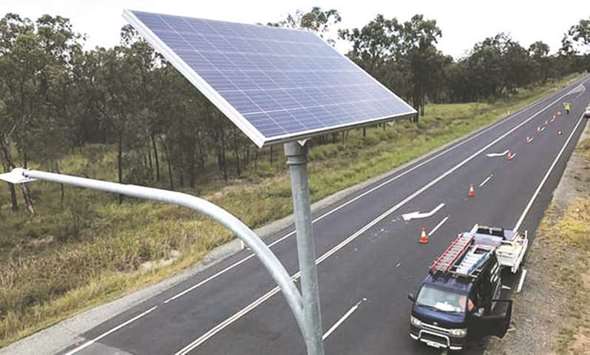“I think renewable energy is where the market’s going – what we class as the energy revolution,” says Jason Sharam.
The self-described “electrician”, who will have grown his Mackay mining energy business from a starting staff of six to 150 by mid-2018, says he is trying to help people “see through the politics” on energy.
“We try to stick to the facts and the real numbers,” Sharam says.
In Mackay, as elsewhere in regional Australia, power prices are already eye-watering for small and medium businesses.
One of Sharam’s clients has gone off the grid to run a diesel generator, which is not cheap, but still cheaper than paying for network electricity at an average of 86 cents – and as much as $1.26 – a kilowatt-hour.
“They’re the sort of stories around, that’s just one client,” he says.
Renewables being held out as a scapegoat for rising costs in the energy debate is “typical politics” but a complete red herring, Sharam says.
The “elephant in the room” is the network and distribution charges that “we’re all paying exorbitant prices [for] and it seems to be the small to medium enterprises that are copping the brunt of it”, Sharam says.
These “go through the roof” when a business uses more than 100 kwh a day.
This is especially so in regional Australia because it lacks the concentrated populations to keep down network and distribution charges, which make up half of a business’s energy bill, he says.
That means renewables like solar are a countervailing force, a way for businesses to drive down their network power costs, even if they stop short of getting off the grid.
Sharam’s Linked Group Services has quit the grid entirely however, and some clients are also interested in “defecting” after hearing how the numbers stack up.
Linked Group has spent $460,000 on a solar and battery installation, including what Sharam thinks is the first off-grid use of a Tesla Powerwall battery system in Australia.
And yet the business will immediately save $75,000 a year on its energy bill – even while paying off a bank loan over six-and-a-half years for the installation.
Linked Group supplies trade services for both coking and thermal coal miners out of the Bowen Basin, as well as manufacturing niche products such as solar lighting towers and transportable, self-sufficient buildings. Their latest product, a solar carport, has caught the interest of construction group Lend Lease.
Sharam says the company’s new Mackay complex will be a showcase for these and other wares, such as an electric vehicle charging station free to the public, and a geothermal air-conditioning system, which halves the energy load by using 90-metre-deep boreholes to dissipate heat and makes more efficient use of the refrigerant.
The complex will use a propane gas-fired micro-turbine as a backup generator.
Sharam believes electricity prices are only going to rise.
And the federal government’s proposed national energy guarantee (Neg), which would scrap renewables’ subsidies and incentives and put responsibility for emissions cuts on power retailers, “isn’t going to help it, it’s going to drive it, to be honest”.
Sharam spoke at the Powering Queensland Summit in Brisbane recently, where the Australian Solar Council chief executive, John Grimes, also addressed the Neg by punctuating his presentation with a picture of reforming Soviet Union leader Mikhail Gorbachev.
“This was to say, economics trumps ideology,” Grimes later told the Guardian. The Neg was a “perverse announcement” by the Turnbull government, which had an “immediate effect” of declaring a Cold War on renewables by sowing “delay, confusion and uncertainty” and scaring investors.
“But my point is we’re on the right side of history and ultimately [renewables] will prevail,” he says.
It’s just a question of a smooth, lowest-cost transition versus an abrupt one, Grimes adds.
With solar now “the cheapest way of generating electricity, period” and wind close behind, it’s not the subsidy cuts that hurt the industry so much as the government’s signals to energy investors who deal in 10 to 15-year timeframes for new generation investments, he says.
“What this government is saying is, we’re completely opposed to renewables and we’re going to lock in and mandate a minimum amount of coal and fossil fuels that are going to underpin our business,” Grimes says. “What the hell? I’m sorry, that’s just way off the planet.”
Grimes says this is despite the premise that renewables targets drive up wholesale power costs being “blown out of the water” three years ago when the Warburton review found the opposite.
Offsetting the solar industry’s “frustration and despair” at the Neg was Queensland’s emergence as “winner of the most improved award” in renewables nationally, Grimes says.
From no large-scale renewables projects approved under the former Liberal National party government, the Palaszczuk Labor government now has 38 under way and in the pipeline.
“It’s a huge turnaround because the resource is fantastic; the state government’s putting out the right signals for investment, and economics and industry has done the rest,” he says.
At the summit, state energy minister, Mark Bailey, announced the government would offer $2,000 rebates on solar battery installations, after making zero-interest loans on solar and battery packages available to 20,000 households.
Grimes credits the Palaszczuk government with taking its support of the solar industry beyond aspiration “both at a policy and a working level”.
Solar council members are being helped by government departments when encountering “red tape roadblocks” or dealing with state-owned energy companies Ergon and Energex over network connections, he says.

